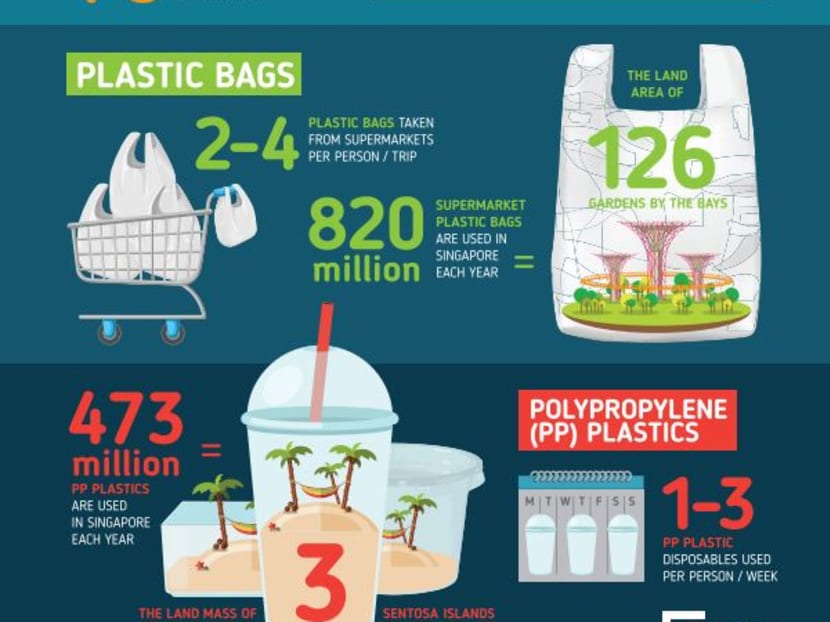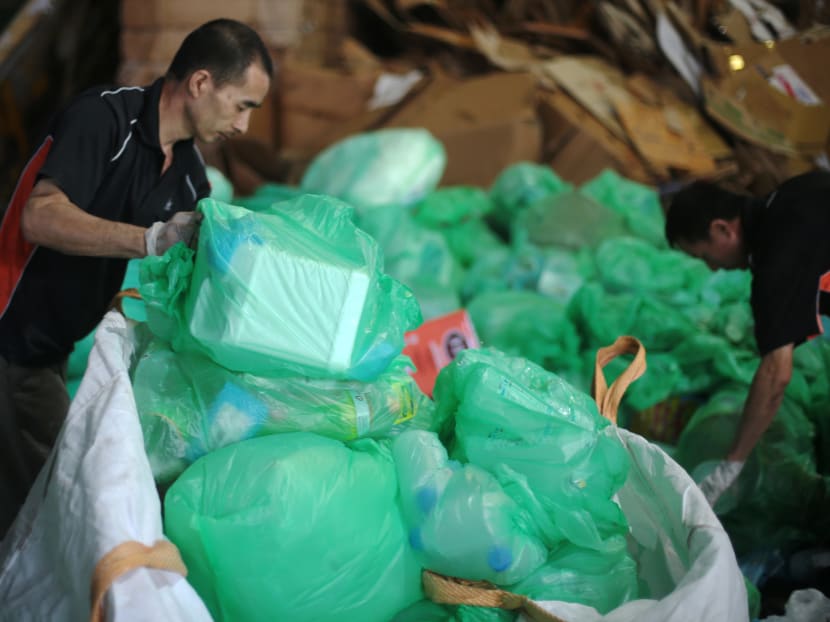Do you know what kind of plastics can be recycled? Majority of Singaporeans have no clue
SINGAPORE — Seven in 10 people in Singapore are not fully certain about the type of plastics that can be recycled, causing many to trash most of the products as general waste instead of recycling them, said the Singapore Environment Council (SEC) in its report on Thursday (Aug 30).
SINGAPORE — Seven in 10 people in Singapore are not fully certain about the type of plastics that can be recycled, causing many to trash most of the products as general waste instead of recycling them, said the Singapore Environment Council (SEC) in its report on Thursday (Aug 30).

The report was derived from an eight-month study which included a recent survey of 1,003 people here on their plastic usage habits and attitudes towards recycling.
To test their level of awareness on the types of plastics that can be recycled here, the respondents were asked to determine if each of the five plastic items – plastic bags, take-away containers (non-polystyrene), styrofoam containers, bottled drinking water and detergent bottles – can be recycled in Singapore.
Only three in 10 gave the correct answers for all five items.
Only 6 per cent of the plastic waste generated in Singapore was recycled last year, the lowest rate in the last decade. In comparison, the United States and Europe recycle 9 and 30 per cent respectively of such waste annually.
Inconvenience was also listed as the top reason for not recycling plastic waste, said the council.
Respondents who cited this reason for not recycling plastic waste (42 per cent) said it was a hassle to bring their bag of recyclables to the recycling bin, separate it from general waste, as well as having to wash, dry and clean the recyclable plastic items.
But others (35 per cent) said they did not recycle these items as they intend to reuse them for other purposes.
To help recycling efforts, 45 per cent of the respondents said they need more information on the different types of plastics, as well as what can or cannot be recycled.
An earlier set of findings from the same survey released by SEC earlier this month found that people here use at least 1.76 billion supermarket plastic bags, plastic bottle and plastic disposables a year. About half of those surveyed also use three or more plastic bags each time they visit the supermarket.
Further findings released on Thursday showed that the respondents were divided over whether imposing a charge on plastic items will be effective in reducing its use.
However, the majority said incentives such as product discounts, shopping vouchers and membership points for bringing their own bag or container would be effective at cutting down the use of plastic.
Speaking to reporters on the sidelines of the Singapore Environmental Achievement Awards on Thursday, SEC chairman Isabella Huang-Loh said the low level of awareness on recycling plastics could be due to an earlier emphasis on recycling items such as paper and tins.
Likewise, plastic products often contain different information on recycling since they are imported from several countries. This makes it more complex for people to understand how plastics can be recycled, she said.
The SEC's report on consumer use of plastic and the waste ecosystem in Singapore also made several recommendations.
WHAT CAN BE DONE:
Replace single-use plastic bags
Retailers can get customers to use reusable bags to bag vegetables and fruits at supermarkets, as well as for the bread at bakeries.
Create a market for innovative uses of recycled plastic
Recycled plastics can be converted to oil and fuel using technology, or used in the production of flat-panel displays, and ink and toner cartridges.
Set up specialised recycling companies
The contracts for collecting general waste and recyclables could be separated to allow specialised companies to enter the Singapore market, providing the technology and capabilities to recycle plastic.
Standardise recycling bins
The colour and shape of recycling bins can be standardised so that recycling can be more intuitive. The same goes for labels so that consumers can easily understand the information on recycling.
Introduce legislation and policies targeted at reducing plastic waste
Make it mandatory for public waste collectors to provide recycling bins and collections services to commercial firms as they produce more plastic waste than households.
Sign up for TODAY's WhatsApp service. Click here:










